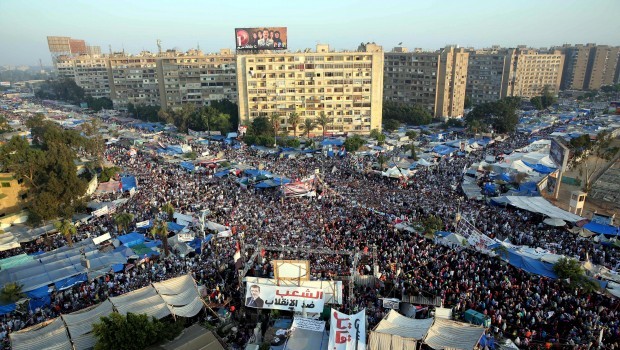
A general view shows Egyptians supporting ousted President Mursi (depicted on poster) during Eid Al-Fitr prayers at the location of their sit-in near Rabaa Al-Adawiya mosque in Cairo, Egypt, on August 8, 2013. (EPA/AHMED RADAMAN.)
Cairo, Asharq Al-Awsat—According to exclusive information obtained by Asharq Al-Awsat, the Egyptian government has set a plan to break up rallies in Rabaa Al-Adawiya Square that Islamists began in protest against the ouster of former president Mohamed Mursi last month.
The leaks come as international efforts to defuse Egypt’s crisis hit a wall amid fears that Islamists will step up violence if authorities attempt to disperse protesters from the square. It is believed that several wanted Brotherhood figures are among those conducting the sit-in.
Following several high-level meetings held during the last two weeks, Egypt’s interim leaders are believed to have decided to put their plan into effect in the next 48 hours, Asharq Al-Awsat has learned.
Senior government sources told Asharq Al-Awsat that, contrary to expectations, the plan will be carried out gradually in an attempt to keep casualties among the Mursi supporters to a minimum.
It has been recently reported that the country’s interim leaders are divided over the best way to end the crisis. While interim prime minister Hazem El-Beblawi and a number of his deputies and ministers, particularly defense minister Gen. Abdel-Fattah El-Sisi, lean towards adopting a confrontational strategy, President Adly Mansour and his deputy, Mohamed El-Baradei, are pushing towards a more pacifist strategy.
However, the source, who spoke on the condition of anonymity, denied that any serious disputes had arisen between Baradei, the military, the presidency and the government.
The source also said that over the past few days the Egyptian government held several meetings where the issue of Rabaa Al-Adawiya was “discussed in a transparent and responsible way.”
“Breaking up the rallies by force will cause approximately 3,000 to 5,000 deaths,” the source announced, adding “this large number of casualties will put us in an awkward position, and we do not want to have economic problems with the world.”
The source revealed that authorities have to offer some compromises “not for the sake of the Brotherhood, but for the country’s best interests.”
“Therefore, we have decided to adopt an alternative plan,” where protesters who “leave rallies at Rabaa Al-Adawiya will not be allowed to return.”
The plan also consists of “blocking food supplies to protesters, as well as cutting off water and electricity in the square where the protesters are.”
The source revealed that water and tear gas will be used to disperse protesters, indicating that “the operation will be carried out in stages and perhaps may take weeks or months.” The source explained that the plan will be finalized “within a three-month deadline.”
The fragile situation of the protesters in Rabaa Al-Adawiya seems to have encouraged the authorities to take this decision, especially because “the rhetoric of the Brotherhood figures speaking in Rabaa Al-Adawiya has become boring to the supporters of the group, particularly after they have repeatedly promised that Mursi would soon return . . . yet nothing has happened.”
As for the consequences the plan might have on the residents of Rabaa Al-Adawiya, the source said: “When carrying out the plan, there will be safe corridors set out in cooperation with human rights organizations to allow civilians free movement.”

Rather than allowing the HRG and other foreigners to meddle, the authorities should allow the venerable Grand Sheikh of Al Azhar to make one last effort to end the crisis and abandon the sit ins at various mosques and squares. As a matter of fact His Eminence has the required competence and authority to intervene and pronounce a judicious solution for the on going crisis. His stature demands that all the concerned parties should listen to him for the sake and benefit of Egypt and the Islamic world. In case the MB combine remains adamant then the authorities would have the full right and the entire Egyptian nation behind them to break the back of mischief makers and end their menace for all times to come.